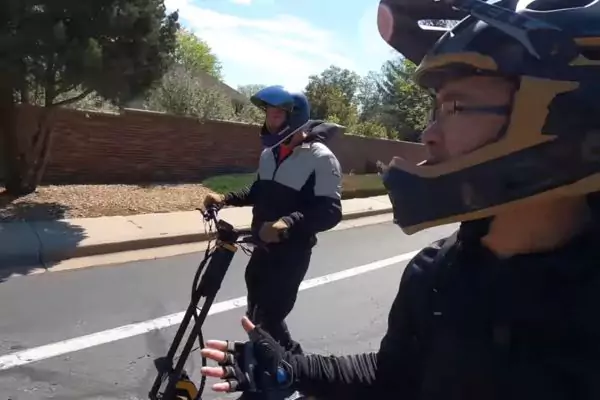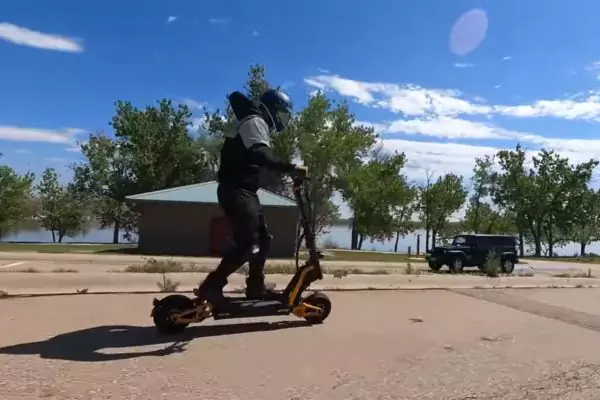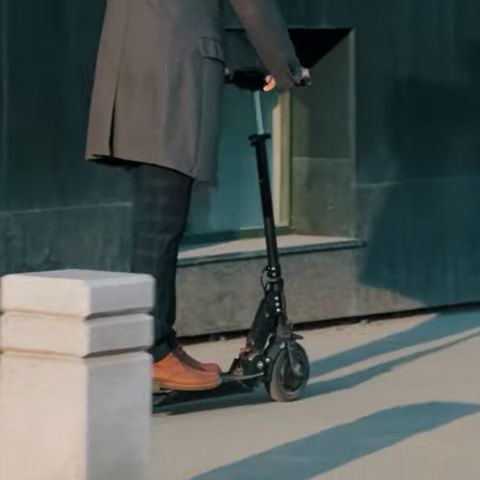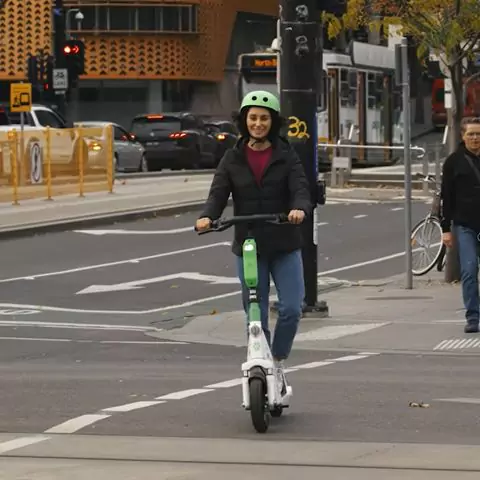There is no statewide law in Oregon regulating the use of electric scooters, so each city and town has its own rules. In general, electric scooters are treated like bicycles, so they are allowed on sidewalks and bike lanes. However, some cities have banned them from sidewalks altogether. There is also a maximum speed limit of 20 mph for all electric scooters.
As of July 1, 2019, electric scooters are legal to ride on Oregon roads. The new law, which went into effect on that date, makes it legal for people to operate electric scooters on any road with a posted speed limit of 35 mph or less. Electric scooters are also allowed on bike lanes, but not on sidewalks.
The new law is a response to the growing popularity of electric scooters. In the past year or so, companies like Bird and Lime have been operating electric scooter-sharing programs in major cities across the country. These programs allow people to rent an electric scooter for a short period of time and then drop it off at their destination.
The new law in Oregon is designed to give people more options for getting around town without having to use a car. It will also help reduce traffic congestion and pollution. The hope is that by making it easier for people to get around town without driving, more people will choose to do so.
There are some restrictions on where you can ride your electric scooter under the new law. For example, you cannot ride on highways or freeways with posted speed limits over 35 mph. You also cannot ride your scooter on sidewalks or in crosswalks.
And finally, you must yield to pedestrians when you are riding on bike lanes and paths.
Contents
- 1 Top 12 Oregon Electric Scooter Laws
- 1.1 1. Age Restrictions for Electric Scooter Riders
- 1.2 2. Licensing and Registration Requirements
- 1.3 3. Helmet Laws
- 1.4 4. Riding Regulations
- 1.5 5. Riding on Sidewalks
- 1.6 6. Riding in Bike Lanes and Roadways
- 1.7 7. Speed Limits
- 1.8 8. Impaired Riding
- 1.9 9. Parking Regulations
- 1.10 10. Insurance Requirements
- 1.11 11. Penalties for Violations
- 2 Do You Need a License to Drive an Electric Scooter in Oregon?
- 3 FAQs
- 4 Electric Scooter Laws – Ultimate 2023 Guide (U.S.)
- 5 Final Thoughts
Top 12 Oregon Electric Scooter Laws
It is essential to understand the laws and regulations governing electric scooters to ensure safe and legal usage. Here are top 12 Oregon electric scooter laws-
1. Age Restrictions for Electric Scooter Riders
In Oregon, riders must be at least 16 years old to operate Class 2 electric scooters without supervision. For riders under 16 years old, supervision by a person who is at least 18 years old is required.
2. Licensing and Registration Requirements

Unlike motorcycles and cars, electric scooters do not require a driver’s license or registration in Oregon. This makes them accessible to a wider range of individuals seeking an efficient and cost-effective mode of transportation.
3. Helmet Laws
Oregon law mandates that all electric scooter riders under the age of 16 must wear a properly fitted helmet while operating the vehicle. It is highly recommended for riders of all ages to prioritize their safety and wear a helmet.
4. Riding Regulations
Electric scooter riders in Oregon are expected to follow the same rules of the road as bicyclists. This includes obeying traffic signals, yielding to pedestrians, and signaling turns when necessary. It is crucial for riders to be attentive and vigilant while sharing the road with other vehicles and pedestrians.
5. Riding on Sidewalks
In most Oregon cities, electric scooters are allowed on sidewalks unless otherwise specified by local ordinances. However, riders must yield to pedestrians and exercise caution to ensure pedestrian safety. It is advisable to check the specific regulations of the city or town where the electric scooter is being operated.
6. Riding in Bike Lanes and Roadways

Electric scooters are permitted in bike lanes and on roadways with speed limits of 25 miles per hour or less. Riders must ride as close to the right-hand side of the road as practicable, allowing faster vehicles to pass when necessary. It is important to remain aware of surrounding traffic and use appropriate hand signals to communicate intentions.
7. Speed Limits
Electric scooters are subject to speed limits while operating on public roads and bike lanes. The maximum speed for Class 1 and Class 2 electric scooters in Oregon is 20 miles per hour. It is crucial for riders to adhere to these limits to ensure their safety and the safety of others.
8. Impaired Riding
Operating an electric scooter under the influence of alcohol or drugs is strictly prohibited in Oregon. Riders must exercise responsible behavior and refrain from riding if their ability to operate the vehicle safely is compromised.
9. Parking Regulations
When parking electric scooters, riders should be mindful of local parking regulations. It is important to park in designated areas, such as bike racks or designated scooter parking zones, to avoid obstructing pedestrian walkways or causing inconvenience to others.
10. Insurance Requirements
Currently, Oregon does not require electric scooter riders to carry insurance. However, it is advisable to check with individual insurance providers regarding coverage options and personal liability.
11. Penalties for Violations
Failure to comply with Oregon’s electric scooter laws can result in penalties, which may include fines and potential suspension of riding privileges. It is essential for riders to familiarize themselves with the laws and regulations to avoid any legal consequences.
Do You Need a License to Drive an Electric Scooter in Oregon?
If you’re planning on driving an electric scooter in Oregon, you may be wondering if you need a license to do so. The answer is yes and no. You don’t need a license if you’re only riding the scooter for personal use, but if you plan on using it for business purposes, then you will need to apply for a business license through the Oregon Department of Transportation.
There are also some other regulations to be aware of when operating an electric scooter in Oregon. For instance, all riders must wear a helmet at all times, and scooters are not allowed on sidewalks or crosswalks. Additionally, riders must yield to pedestrians and give them the right-of-way at all times.
So, while you don’t technically need a license to drive an electric scooter in Oregon, there are still some important rules and regulations that you need to follow. Be sure to familiarize yourself with these before hitting the road on your new ride!
FAQs
Are Electric Scooters Legal in Oregon?
Electric scooters are not currently legal in Oregon. State law prohibits the use of motorized vehicles on sidewalks, and electric scooters fall under this category. There have been efforts to change the law and allow electric scooters in Oregon, but so far these have failed.
you can still enjoy riding an electric scooter in Oregon by using private property or off-road trails.
What Kind of Scooter Does Not Require a License in Oregon?
In Oregon, any scooter with an engine size of 50cc or less does not require a license. This includes electric scooters as well. If your scooter has an engine size larger than 50cc, you will need to have a valid driver’s license in order to operate it legally on public roads.
What Happens If You Get Caught Riding an Electric Scooter?
Electric scooters are a popular mode of transportation, but they are also illegal in many places. If you’re caught riding one, you could be fined or even arrested. In some states, electric scooters are considered motor vehicles and must be licensed and insured.
In others, they are considered toys and cannot be ridden on public roads. Either way, if you’re caught riding an electric scooter without permission, you could face consequences.
Can You Legally Ride an Electric Scooter on the Road?
Yes, you can ride an electric scooter on the road. In most states, electric scooters are classified as bicycles, so they are subject to the same rules and regulations as bicycles. This means that you must ride in the bike lane and yield to pedestrians.
Electric Scooter Laws – Ultimate 2023 Guide (U.S.)
Final Thoughts
Oregon has some of the most lenient laws in the country when it comes to electric scooters. There is no age limit for riding an electric scooter, and there is no need for a license or insurance. Helmets are not required by law, but riders are encouraged to wear one.
Scooters can be ridden on sidewalks, bike lanes, and crosswalks. Drivers must yield to pedestrians and give them the right of way.


